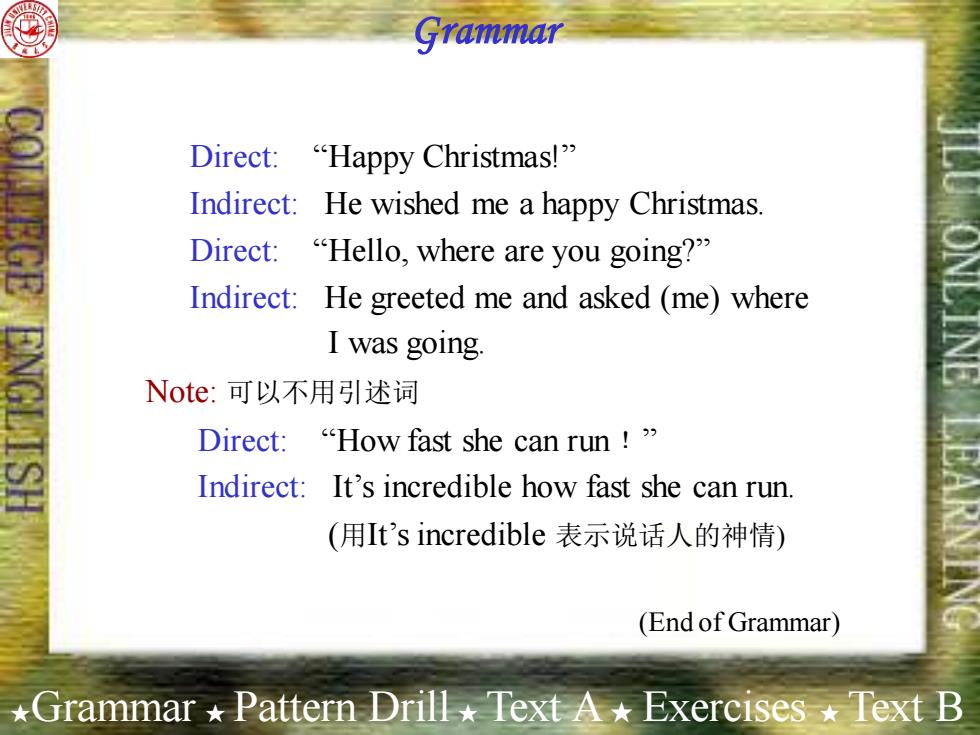
rammar Direct:He said,"Bring me a book!" Indirect:He asked her (him,us etc.)to bring him a book. Direct:He said to me,"Stay here." Indirect:He asked me to stay there. BUT:Note that the infinitive is not always used e.g.He told her that she should bring him a book. *Grammar Pattern Drill Text A*Exercises Text B
Direct: He said,”Bring me a book!” Indirect: He asked her (him, us etc.) to bring him a book. Direct: He said to me, “Stay here.” Indirect: He asked me to stay there. BUT: Note that the infinitive is not always used, e.g. He told her that she should bring him a book. Grammar ★Grammar ★ Pattern Drill ★ Text A ★ Exercises ★ Text B

Grammar 4)Negative commands,requests,etc.are usually reported by“not+infinitive.” Direct:"Don't do it!" Indirect:He asked me (her,us,etc)not to do it. Direct::He told me,“Don't go away.” Indirect:He told me not to go away. BUT:Note that the infinitive is not always used. e.g.He told her that she should not do it. *Grammar Pattern Drill Text A Exercises Text B
4) Negative commands, requests, etc. are usually reported by “not+infinitive.” Direct: “Don’t do it!” Indirect: He asked me (her, us,etc) not to do it. Direct: He told me, “Don’t go away.” Indirect: He told me not to go away. BUT: Note that the infinitive is not always used. e.g. He told her that she should not do it. Grammar ★Grammar ★ Pattern Drill ★ Text A ★ Exercises ★ Text B

rammar 3.Exclamations(感叹句)in indirect speech Exclamations become statements.Reporting an exclamation is usually best achieved by a roundabout expression reflecting the spirit of the original exclamation. Direct::“What a lovely garden(itis)! Indirect:He remarked that it was a lovely garden Direct:"How wonderful!" Indirect:He said it was wonderful *Grammar Pattern Drill Text A Exercises Text B
3. Exclamations (感叹句) in indirect speech Exclamations become statements. Reporting an exclamation is usually best achieved by a roundabout expression reflecting the spirit of the original exclamation. Direct: “What a lovely garden ( it is )!” Indirect: He remarked that it was a lovely garden. Direct: “How wonderful!” Indirect: He said it was wonderful. Grammar ★Grammar ★ Pattern Drill ★ Text A ★ Exercises ★ Text B

Grammar Direct:"Happy Christmas!" Indirect:He wished me a happy Christmas. Direct:"Hello,where are you going?" Indirect:He greeted me and asked (me)where I was going. Note:可以不用引述词 Direct:.“How fast she can run! Indirect:It's incredible how fast she can run (用It's incredible表示说话人的神情) (End of Grammar) *Grammar Pattern Drill Text A*Exercises Text B
Direct: “Happy Christmas!” Indirect: He wished me a happy Christmas. Direct: “Hello, where are you going?” Indirect: He greeted me and asked (me) where I was going. Note: 可以不用引述词 Direct: “How fast she can run﹗” Indirect: It’s incredible how fast she can run. (用It’s incredible 表示说话人的神情) (End of Grammar) Grammar ★Grammar ★ Pattern Drill ★ Text A ★ Exercises ★ Text B

rammar 4.Put the following into indirect speech,with the introducing verbs in the past tense.Pretend that A has said the following things to you(B).You are now reporting what A said to your friend (C) 1)How old is he now?Can he read yet? He asked how old he was and if he could read yet. 2)What do you mean?Do you think I'm mad? He asked what I meant and if I thought he was mad. *Grammar Pattern Drill Text A*Exercises Text B
He asked how old he was and if he could read yet. He asked what I meant and if I thought he was mad. Grammar ★Grammar ★ Pattern Drill ★ Text A ★ Exercises ★ Text B 4. Put the following into indirect speech, with the introducing verbs in the past tense. Pretend that A has said the following things to you (B). You are now reporting what A said to your friend (C): 1) How old is he now? Can he read yet? 2) What do you mean? Do you think I’m mad?